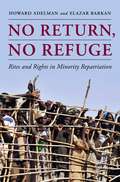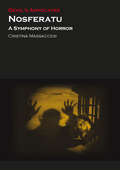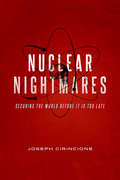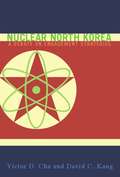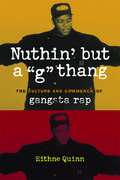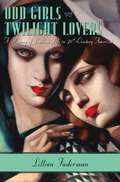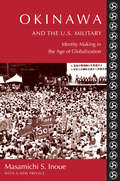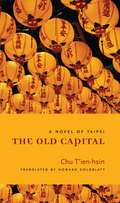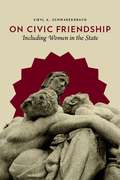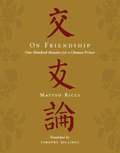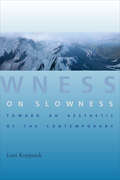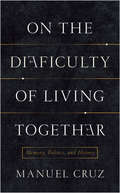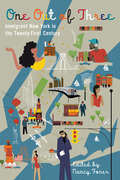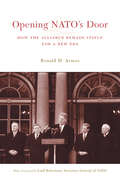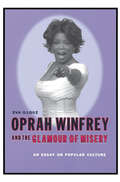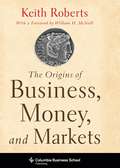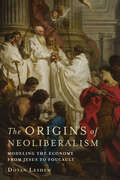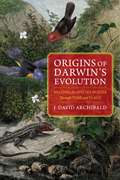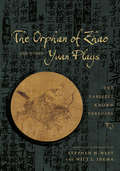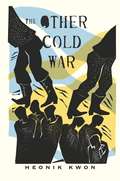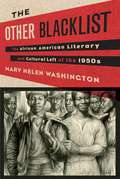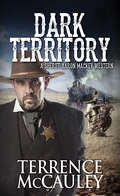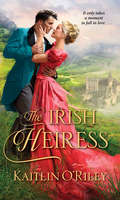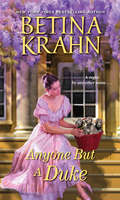- Table View
- List View
No Return, No Refuge: Rites and Rights in Minority Repatriation
by Elazar Barkan Howard AdelmanRefugee displacement is a global phenomenon that has uprooted millions of individuals over the past century. In the 1980s, repatriation became the preferred option for resolving the refugee crisis. As human rights achieved global eminence, refugees' right of return fell under its umbrella. Yet return as a right and its practice as a rite created a radical disconnect between principle and everyday practice, and the repatriation of refugees and Internally Displaced Persons (IDPs) remains elusive in cases of forced displacement of victims by ethnic conflict.Reviewing cases of ethnic displacement throughout the twentieth century in Europe, Asia, and Africa, Howard Adelman and Elazar Barkan juxtapose the empirical lack of repatriation in cases of ethnic conflict, unless accompanied by coercion. The emphasis on repatriation during the last several decades has obscured other options, leaving refugees to spend years warehoused in camps. Repatriation takes place when identity, defined by ethnicity or religion, is not at the center of the displacing conflict, or when the ethnic group to which the refugees belong are not a minority in their original country or in the region to which they want to return. Rather than perpetuate a ritual belief in return as a right without the prospect of realization, Adelman and Barkan call for solutions that bracket return as a primary focus in cases of ethnic conflict.
Nosferatu: A Symphony of Horror (Devil's Advocates)
by Cristina MassaccesiNosferatu: A Symphony of Horror, directed by German director Friedrich Wilhelm Murnau in 1922, is not only regarded as one of the most intriguing and disquieting films to have been produced during the years of Weimar cinema but is also a key step in establishing the vampire as a cinematic figure and in shaping its connection with our subconscious fears and desires. In her analysis of this hugely influential film, Cristina Massaccesi unravels the never-ending fascination exercised by the film over generations of viewers and filmmakers whilst at the same time providing the reader with a clear guide about the film's contexts, cinematography, and possible interpretations, covering the political and social context of the Weimar Republic and its film industry, the German Expressionist movement, the film's production, reception and difficult initial release. The book also includes the results of a lengthy interview between the author and E. Elias Merhige, director of the Nosferatu homage, Shadow of the Vampire (2000).
Nuclear Nightmares: Securing the World Before It Is Too Late
by Joseph CirincioneThere is a high risk that someone will use, by accident or design, one or more of the 17,000 nuclear weapons in the world today. Many thought such threats ended with the Cold War or that current policies can prevent or contain nuclear disaster. They are dead wrong—these weapons, possessed by states large and small, stable and unstable, remain an ongoing nightmare.Joseph Cirincione surveys the best thinking and worst fears of experts specializing in nuclear warfare and assesses the efforts to reduce or eliminate these nuclear dangers. His book offers hope: in the 1960s, twenty-three states had nuclear weapons and research programs; today, only nine states have weapons. More countries have abandoned nuclear weapon programs than have developed them, and global arsenals are just one-quarter of what they were during the Cold War. Yet can these trends continue, or are we on the brink of a new arms race—or worse, nuclear war? A former member of Senator Obama's nuclear policy team, Cirincione helped shape the policies unveiled in Prague in 2009, and, as president of an organization intent on reducing nuclear threats, he operates at the center of debates on nuclear terrorism, new nuclear nations, and the risks of existing arsenals.
Nuclear North Korea: A Debate on Engagement Strategies (Contemporary Asia In The World)
by Victor Cha David KangThe regime of Kim Jong-Il has been called "mad," "rogue," even, by the Wall Street Journal, the equivalent of an "unreformed serial killer." Yet, despite the avalanche of television and print coverage of the Pyongyang government's violation of nuclear nonproliferation agreements and existing scholarly literature on North Korean policy and security, this critical issue remains mired in political punditry and often misleading sound bites. Victor Cha and David Kang step back from the daily newspaper coverage and cable news commentary and offer a reasoned, rational, and logical debate on the nature of the North Korean regime. Coming to the issues from different perspectives—Kang believes the threat posed by Pyongyang has been inflated and endorses a more open approach, while Cha is more skeptical and advocates harsher measures—the authors together have written an essential work of clear-eyed reflection and authoritative analysis. They refute a number of misconceptions and challenge much faulty thinking that surrounds the discussion of North Korea, particularly the idea that North Korea is an irrational nation. Cha and Kang contend that however provocative, even deplorable, the Pyongyang government's behavior may at times be, it is not incomprehensible or incoherent. Neither is it "suicidal," they argue, although crisis conditions could escalate to a degree that provokes the North Korean regime to "lash out" as the best and only policy, the unintended consequence of which are suicide and/or collapse. Further, the authors seek to fill the current scholarly and policy gap with a vision for a U.S.-South Korea alliance that is not simply premised on a North Korean threat, not simply derivative of Japan, and not eternally based on an older, "Korean War generation" of supporters.This book uncovers the inherent logic of the politics of the Korean peninsula, presenting an indispensable context for a new policy of engagement. In an intelligent and trenchant debate, the authors look at the implications of a nuclear North Korea for East Asia and U.S. homeland security, rigorously assessing historical and current U.S. policy, and provide a workable framework for constructive policy that should be followed by the United States, Japan, and South Korea if engagement fails to stop North Korean nuclear proliferation.
Nuthin' but a "G" Thang: The Culture and Commerce of Gangsta Rap (Popular Cultures, Everyday Lives)
by Eithne QuinnIn the late 1980s, gangsta rap music emerged in urban America, giving voice to—and making money for—a social group widely considered to be in crisis: young, poor, black men. From its local origins, gangsta rap went on to flood the mainstream, generating enormous popularity and profits. Yet the highly charged lyrics, public battles, and hard, fast lifestyles that characterize the genre have incited the anger of many public figures and proponents of "family values." Constantly engaging questions of black identity and race relations, poverty and wealth, gangsta rap represents one of the most profound influences on pop culture in the last thirty years.Focusing on the artists Ice Cube, Dr. Dre, the Geto Boys, Snoop Dogg, and Tupac Shakur, Quinn explores the origins, development, and immense appeal of gangsta rap. Including detailed readings in urban geography, neoconservative politics, subcultural formations, black cultural debates, and music industry conditions, this book explains how and why this music genre emerged. In Nuthin'but a "G" Thang, Quinn argues that gangsta rap both reflected and reinforced the decline in black protest culture and the great rise in individualist and entrepreneurial thinking that took place in the U.S. after the 1970s. Uncovering gangsta rap's deep roots in black working-class expressive culture, she stresses the music's aesthetic pleasures and complexities that have often been ignored in critical accounts.
Odd Girls and Twilight Lovers: A History of Lesbian Life in Twentieth-Century America
by Lillian FadermanAs Lillian Faderman writes, there are "no constants with regard to lesbianism," except that lesbians prefer women. In this groundbreaking book, she reclaims the history of lesbian life in twentieth-century America, tracing the evolution of lesbian identity and subcultures from early networks to more recent diverse lifestyles. She draws from journals, unpublished manuscripts, songs, media accounts, novels, medical literature, pop culture artifacts, and oral histories by lesbians of all ages and backgrounds, uncovering a narrative of uncommon depth and originality.
Okinawa and the U.S. Military: Identity Making in the Age of Globalization
by Masamichi InoueIn 1995, an Okinawan schoolgirl was brutally raped by several U.S. servicemen. The incident triggered a chain of protests by women's groups, teachers' associations, labor unions, reformist political parties, and various grassroots organizations across Okinawa prefecture. Reaction to the crime culminated in a rally attended by some 85,000 people, including business leaders and conservative politicians who had seldom raised their voices against the U.S. military presence.Using this event as a point of reference, Inoue explores how Okinawans began to regard themselves less as a group of uniformly poor and oppressed people and more as a confident, diverse, middle-class citizenry embracing the ideals of democracy, human rights, and women's equality. As this identity of resistance has grown, however, the Japanese government has simultaneously worked to subvert it, pressuring Okinawans to support a continued U.S. presence. Inoue traces these developments as well, revealing the ways in which Tokyo has assisted the United States in implementing a system of governance that continues to expand through the full participation and cooperation of residents.Inoue deftly connects local social concerns with the larger political processes of the Japanese nation and the global strategies of the United States. He critically engages social-movement literature along with postmodern/structural/colonial discourses and popular currents and themes in Okinawan and Japanese studies. Rich in historical and ethnographical detail, this volume is a nuanced portrait of the impact of Japanese colonialism, World War II, and U.S. military bases on the formation of contemporary Okinawan identity.
The Old Capital: A Novel of Taipei (Modern Chinese Literature from Taiwan)
by T'Ien-Hsin ChuChu T'ien-hsin's The Old Capital is a brilliant evocation of Taiwan's literature of nostalgia and remembrance. The novel is centered on the question, "Is it possible that none of your memories count?" and explores the reliability of remembrances and the thin line that separates fact from fantasy.Comprised of four thematically linked stories and a novella, The Old Capital focuses on the cultural and psychological realities of contemporary Taiwan. The stories are narrated by individuals who share an aching nostalgia for a time long past. Strolling through modern Taipei, they return to the lost, imperfect memories called forth by the smells and sensations of their city, and try to reconcile themselves to their rapidly changing world. The novella is built on the memories and recollections of a woman trying to make sense of herself and her homeland. After a trip to Kyoto to meet with a friend, she returns to Taipei, where, having been mistaken for a Japanese tourist, she revisits the sites of her youth using a Japanese colonial map of the city. Seeing Taipei anew, the narrator confronts the complex nature of her identity, embodied in the contrast between a serene and preserved Kyoto and a thoroughly modernized and chaotic Taipei. The growing angst of these narrators reflects a deeper anxiety over the legacy of Japan and America in Taiwan. The titles of the stories themselves-"Death in Venice," "Man of La Mancha," "Breakfast at Tiffany's," "Hungarian Water"-reveal the strong currents of influence that run throughout the collection and shape the content and texture of the writing. In his meticulous translation, Howard Goldblatt captures the casual, intimate feel of Chu T'ien-hsin's writing while also maintaining its multiple layers of meaning. An intertextual masterpiece, The Old Capital is a moving and highly sensual meditation on the elasticity of memory and its power to shape personal identity.
On Civic Friendship: Including Women in the State
by Sibyl SchwarzenbachWomen have performed the vast majority of often unpaid friendship labor for centuries. Embodying the freedom, equality, and ideals of the Constitution, civic friendship emerges as a necessary condition for genuine justice. Through a critical examination of social and political relationships from ancient times to today, Sibyl Schwarzenbach develops a truly innovative, feminist theory of the democratic state. Beginning with an analysis of Aristotle's notion of political friendship, Schwarzenbach brings the philosopher's insights to bear on the social and political requirements of the modern state. She elaborates a conception of civic friendship that, with its ethical reproductive praxis, functions differently from male-centered notions of fraternity and, with its female participants, remains fundamentally separate from generalized, male-inflected claims of Marxist solidarity. Schwarzenbach also distinguishes civic friendship from feminist calls for public care, arguing that friendship, unlike care, not only is reciprocal but also seeks to establish and maintain equality. Schwarzenbach concludes with various public institutions-economic, legal, and social-that can promote civic friendship without sacrificing crucial liberties. In fact, women's entrance into the public sphere en masse makes such ideals realistic within a competitive, individualistic society.
On Friendship: One Hundred Maxims for a Chinese Prince
by Matteo Ricci"On Friendship, with its total of one hundred sayings, is the perfect gift for friends."-Feng Yingjing, renowned scholar and civic official, 1601Matteo Ricci (1552-1610) is best known as the Italian Jesuit missionary who brought Christianity to China. He also published a landmark text on friendship-the first book to be written in Chinese by a European-that instantly became a late Ming best seller. On Friendship distilled the best ideas on friendship from Renaissance Latin texts into one hundred pure and provocative Chinese maxims. Written in a masterful classical style, Ricci's sayings established his reputation as a great sage and the sentiments still ring true.Available for the first time in English, On Friendship matches a carefully edited Chinese text with a facing-page English translation and includes notes on sources and biographical, historical, and cultural information. Still admired in China for its sophistication and inspirational wisdom, On Friendship is a delightful cross-cultural work by a crucial and fascinating historical figure. It is also an excellent tool for learning Chinese, pairing a superb model of the classical language with an accessible and accurate translation.
On Slowness: Toward an Aesthetic of the Contemporary (Columbia Themes in Philosophy, Social Criticism, and the Arts)
by Lutz KoepnickSpeed is an obvious facet of contemporary society, whereas slowness has often been dismissed as conservative and antimodern. Challenging a long tradition of thought, Lutz Koepnick instead proposes we understand slowness as a strategy of the contemporary—a decidedly modern practice that gazes firmly at and into the present's velocity.As he engages with late twentieth- and early twenty-first-century art, photography, video, film, and literature, Koepnick explores slowness as a critical medium to intensify our temporal and spatial experiences. Slowness helps us register the multiple layers of time, history, and motion that constitute our present. It offers a timely (and untimely) mode of aesthetic perception and representation that emphasizes the openness of the future and undermines any conception of the present as a mere replay of the past. Discussing the photography and art of Janet Cardiff, Olafur Eliasson, Hiroshi Sugimoto, and Michael Wesely; the films of Peter Weir and Tom Tykwer; the video installations of Douglas Gordon, Willie Doherty, and Bill Viola; and the fiction of Don DeLillo, Koepnick shows how slowness can carve out spaces within processes of acceleration that allow us to reflect on alternate temporalities and durations.
On the Difficulty of Living Together: Memory, Politics, and History (New Directions in Critical Theory #21)
by Manuel CruzIn On the Difficulty of Living Together, Manuel Cruz launches a nuanced study of memory and forgetting, defining their forms and uses, political meanings, and social and historical implications. Memory is not an intrinsically positive phenomenon, he argues, but an impressionable and malleable one, used to advance a variety of agendas. Cruz focuses on five memory models: that which is inherently valuable, that which legitimizes the present, that which supports retributive justice, that which is essential to mourning, and that which elicits renunciation or revelation. His methodical approach makes sense of memory's positive and negative effects, its contradictions, and its tensions. Cruz shows us that remembering is not necessarily an end in itself, nor is it a supreme value, immune to external influence. The exercise of memory guarantees nothing, though many insist it is a progressive act preventing the repetition of past mistakes. Tying the making of memory to the movements of history, Cruz prioritizes memory's political dimensions over its philosophical aspects and helps us remember its myriad uses.
One Out of Three: Immigrant New York in the Twenty-First Century
by Nancy FonerThis absorbing anthology features in-depth portraits of diverse ethnic populations, revealing the surprising new realities of immigrant life in twenty-first-century New York City. Contributors show how nearly fifty years of massive inflows have transformed New York City's economic and cultural life and how the city has changed the lives of immigrant newcomers.Nancy Foner's introduction describes New York's role as a special gateway to America. Subsequent essays focus on the Chinese, Dominicans, Jamaicans, Koreans, Liberians, Mexicans, and Jews from the former Soviet Union now present in the city and fueling its population growth. They discuss both the large numbers of undocumented Mexicans living in legal limbo and the new, flourishing community organizations offering them opportunities for advancement. They recount the experiences of Liberians fleeing a war torn country and their creation of a vibrant neighborhood on Staten Island's North Shore. Through engaging, empathetic portraits, contributors consider changing Korean-owned businesses and Chinese Americans' increased representation in New York City politics, among other achievements and social and cultural challenges. A concluding chapter follows the prospects of the U.S.-born children of immigrants as they make their way in New York City.
Opening NATO's Door: How the Alliance Remade Itself for a New Era (A Council on Foreign Relations Book)
by Ronald AsmusHow and why did NATO, a Cold War military alliance created in 1949 to counter Stalin's USSR, become the cornerstone of new security order for post-Cold War Europe? Why, instead of retreating from Europe after communism's collapse, did the U.S. launch the greatest expansion of the American commitment to the old continent in decades? Written by a high-level insider, Opening NATO's Door provides a definitive account of the ideas, politics, and diplomacy that went into the historic decision to expand NATO to Central and Eastern Europe. Drawing on the still-classified archives of the U.S. Department of State, Ronald D. Asmus recounts how and why American policy makers, against formidable odds at home and abroad, expanded NATO as part of a broader strategy to overcome Europe's Cold War divide and to modernize the Alliance for a new era.Asmus was one of the earliest advocates and intellectual architects of NATO enlargement to Central and Eastern Europe after the collapse of communism in the early 1990s and subsequently served as a top aide to Secretary of State Madeleine Albright and Deputy Secretary Strobe Talbott, responsible for European security issues. He was involved in the key negotiations that led to NATO's decision to extend invitations to Poland, Hungary, and the Czech Republic, the signing of the NATO-Russia Founding Act, and finally, the U.S. Senate's ratification of enlargement.Asmus documents how the Clinton Administration sought to develop a rationale for a new NATO that would bind the U.S. and Europe together as closely in the post-Cold War era as they had been during the fight against communism. For the Clinton Administration, NATO enlargement became the centerpiece of a broader agenda to modernize the U.S.-European strategic partnership for the future. That strategy reflected an American commitment to the spread of democracy and Western values, the importance attached to modernizing Washington's key alliances for an increasingly globalized world, and the fact that the Clinton Administration looked to Europe as America's natural partner in addressing the challenges of the twenty-first century.As the Alliance weighs its the future following the September 11 terrorist attacks on the U.S. and prepares for a second round of enlargement, this book is required reading about the first post-Cold War effort to modernize NATO for a new era.
Oprah Winfrey and the Glamour of Misery: An Essay on Popular Culture
by Eva IllouzOprah Winfrey is the protagonist of the story to be told here, but this book has broader intentions, begins Eva Illouz in this original examination of how and why this talk show host has become a pervasive symbol in American culture. Unlike studies of talk shows that decry debased cultural standards and impoverished political consciousness, Oprah Winfrey and the Glamour of Misery asks us to rethink our perceptions of culture in general and popular culture in particular.At a time when crises of morality, beliefs, value systems, and personal worth dominate both public and private spheres, Oprah's emergence as a cultural form—the Oprah persona—becomes clearer, as she successfully reiterates some of our most pressing moral questions. Drawing on nearly one hundred show transcripts; a year and a half of watching the show regularly; and analysis of magazine articles, several biographies, O Magazine, Oprah Book Club novels, self-help manuals promoted on the show, and hundreds of discussions on the Oprah Winfrey Web site, Illouz takes the Oprah industry seriously, revealing it to be a multilayered "textual structure" that initiates, stages, and performs narratives of suffering and self-improvement that resonate with a wide audience and challenge traditional models of cultural analysis. This book looks closely at Oprah's method and her message, and in the process reconsiders popular culture and the tools we use to understand it.
The Origins of Business, Money, and Markets (Columbia Business School Publishing)
by Keith RobertsTo understand business and its political, cultural, and economic context, it helps to view it historically, yet most business histories look no further back than the nineteenth century. The full sweep of business history actually begins much earlier, with the initial cities of Mesopotamia. In the first book to describe and explain these origins, Roberts depicts the society of ancient traders and consumers, tracing the roots of modern business and underscoring the relationship between early and modern business practice. Roberts's narrative begins before business, which he defines as selling to voluntary buyers at a profit. Before business, he shows, the material conditions and concepts for the pursuit of profit did not exist, even though trade and manufacturing took place. The earliest business, he suggests, arose with the long distance trade of early Mesopotamia, and expanded into retail, manufacturing and finance in these command economies, culminating in the Middle Eastern empires. (Part One) But it was the largely independent rise of business, money, and markets in classical Greece that produced business much as we know it. Alexander the Great's conquests and the societies that his successors created in their kingdoms brought a version of this system to the old Middle Eastern empires, and beyond. (Part Two) At Rome this entrepreneurial market system gained important new features, including business corporations, public contracting, and even shopping malls. The story concludes with the sharp decline of business after the 3rd century CE. (Part Three) In each part, Roberts portrays the major new types of business coming into existence. He weaves these descriptions into a narrative of how the prevailing political, economic, and social culture shaped the nature and importance of business and the status, wealth, and treatment of business people. Throughout, the discussion indicates how much (and how little) business has changed, provides a clear picture of what business actually is, presents a model for understanding the social impact of business as a whole, and yields stimulating insights for public policy today.
The Origins of Neoliberalism: Modeling the Economy from Jesus to Foucault
by Dotan LeshemDotan Leshem recasts the history of the West from an economic perspective, bringing politics, philosophy, and the economy closer together and revealing the significant role of Christian theology in shaping economic and political thought. He begins with early Christian treatment of economic knowledge and the effect of this interaction on ancient politics and philosophy. He then follows the secularization of the economy in liberal and neoliberal theory.Leshem draws on Hannah Arendt's history of politics and Michel Foucault's genealogy of economy and philosophy. He consults exegetical and apologetic tracts, homilies and eulogies, manuals and correspondence, and Church canons and creeds to trace the influence of the economy on Christian orthodoxy. Only by relocating the origins of modernity in Late Antiquity, Leshem argues, can we confront the full effect of the neoliberal marketized economy on contemporary societies. Then, he proposes, a new political philosophy that re-secularizes the economy will take shape and transform the human condition.
Origins of Darwin's Evolution: Solving the Species Puzzle Through Time and Place
by J. David ArchibaldHistorical biogeography—the study of the history of species through both time and place—first convinced Charles Darwin of evolution. This field was so important to Darwin’s initial theories and line of thinking that he said as much in the very first paragraph of On the Origin of Species (1859) and later in his autobiography. His methods included collecting mammalian fossils in South America clearly related to living forms, tracing the geographical distributions of living species across South America, and sampling peculiar fauna of the geologically young Galápagos Archipelago that showed evident affinities to South American forms. Over the years, Darwin collected other evidence in support of evolution, but his historical biogeographical arguments remained paramount, so much so that he devotes three full chapters to this topic in On the Origin of Species.Discussions of Darwin’s landmark book too often give scant attention to this wealth of evidence, and we still do not fully appreciate its significance in Darwin’s thinking. In Origins of Darwin’s Evolution, J. David Archibald explores this lapse, showing how Darwin first came to the conclusion that, instead of various centers of creation, species had evolved in different regions throughout the world. He also shows that Darwin’s other early passion—geology—proved a more elusive corroboration of evolution. On the Origin of Species has only one chapter dedicated to the rock and fossil record, as it then appeared too incomplete for Darwin’s evidentiary standards. Carefully retracing Darwin’s gathering of evidence and the evolution of his thinking, Origins of Darwin’s Evolution achieves a new understanding of how Darwin crafted his transformative theory.
The Orphan of Zhao and Other Yuan Plays: The Earliest Known Versions (Translations from the Asian Classics)
by Stephen West Wilt IdemaThis is the first anthology of Yuan-dynasty zaju (miscellaneous comedies) to introduce the genre to English-speaking readers exclusively through translations of the plays' fourteenth-century editions. Almost all previous translations of Yuan-dynasty zaju are based on late-Ming regularized editions that were heavily adapted for performance at the Ming imperial court and then extensively revised in the seventeenth century for the reading pleasure of Jiangnan literati. These early editions are based on leading actor scripts and contain arias, prose dialogue, and cue lines. They encompass a fascinating range of subject matter, from high political intrigue to commoner life and religious conversion. Crackling with raw emotion, violent imagery, and colorful language and wit, the zaju in this volume explore the consequences of loyalty and betrayal, ambition and enlightenment, and piety and drunkenness. The collection features seven of the twenty-six available untranslated zaju published in the fourteenth century, with a substantial introduction preceding each play and extensive annotations throughout. The editors also include translations of the Ming versions of four of the included plays and an essay that synthesizes recent Chinese and Japanese scholarship on the subject.
The Other Cold War (Columbia Studies in International and Global History)
by Heonik KwonIn this conceptually bold project, Heonik Kwon uses anthropology to interrogate the cold war's cultural and historical narratives. Adopting a truly panoramic view of local politics and international events, he challenges the notion that the cold war was a global struggle fought uniformly around the world and that the end of the war marked a radical, universal rupture in modern history.Incorporating comparative ethnographic study into a thorough analysis of the period, Kwon upends cherished ideas about the global and their hold on contemporary social science. His narrative describes the slow decomposition of a complex social and political order involving a number of local and culturally creative processes. While the nations of Europe and North America experienced the cold war as a time of "long peace," postcolonial nations entered a different reality altogether, characterized by vicious civil wars and other exceptional forms of violence. Arguing that these events should be integrated into any account of the era, Kwon captures the first sociocultural portrait of the cold war in all its subtlety and diversity.
The Other Blacklist: The African American Literary and Cultural Left of the 1950s
by Mary WashingtonMary Helen Washington recovers the vital role of 1950s leftist politics in the works and lives of modern African American writers and artists. While most histories of McCarthyism focus on the devastation of the blacklist and the intersection of leftist politics and American culture, few include the activities of radical writers and artists from the Black Popular Front. Washington's work incorporates these black intellectuals back into our understanding of mid-twentieth-century African American literature and art and expands our understanding of the creative ferment energizing all of America during this period.Mary Helen Washington reads four representative writers—Lloyd Brown, Frank London Brown, Alice Childress, and Gwendolyn Brooks—and surveys the work of the visual artist Charles White. She traces resonances of leftist ideas and activism in their artistic achievements and follows their balanced critique of the mainstream liberal and conservative political and literary spheres. Her study recounts the targeting of African American as well as white writers during the McCarthy era, reconstructs the events of the 1959 Black Writers' Conference in New York, and argues for the ongoing influence of the Black Popular Front decades after it folded. Defining the contours of a distinctly black modernism and its far-ranging radicalization of American politics and culture, Washington fundamentally reorients scholarship on African American and Cold War literature and life.
Dark Territory (A Sheriff Aaron Mackey Western #2)
by Terrence McCauleyIn the boomtown of Dover Station, Montana, tracks have been laid and everyone’s looking to make a fortune, lawfully or not. And the law has something to say about it—one bullet at a time . . . DOVER STATION—WHERE DEATH RIDES FASTER THAN THE WIND A rash of deadly train robberies has the chief investor of Dover Station feeling itchier than a quick draw without a target. And he wants Sheriff Aaron Mackey to scratch that itch with every bullet his battered badge authorizes him to shoot. When Mackey and his backup gun down four kill-crazy bandits, they uncover a plot cooked up by respected citizens of Dover Station—someone who can pull enough strings to replace Mackey with a disgraced marshal from Texas. Now Mackey’s badge may not say much, but his gun defies all fear. Anyone who stands between Mackey and the future of Dover Station is about to become buried in the pages of history . . . “Hard to put down . . . because of the gritty and stylish narrative, the virtually nonstop action.” —Publishers Weekly on Terrence McCauley’s Sympathy for the Devil
The Irish Heiress (Hamilton Cousins #2)
by Kaitlin O'RileyThe Hamilton sisters have found true love to rival any novels sold in their famous London bookshops. And the story continues, as each of their offspring discovers the perfect partner . . . Quiet and intuitive, Lady Mara Reeves has always felt more at home amid the green hills of her native Ireland than in London’s stifling ballrooms. Determined to remain single, she’s adept at gently rebuffing any suitor who comes her way. So why is she so drawn to Foster Sheridan, Earl of Sterling? It’s a connection unlike anything she’s ever known, yet complicated by one scandalous fact: the man she believes to be her destiny is already married . . . Trapped in a loveless union with a woman who refuses to divorce him, Foster is resigned to loneliness until he meets the exquisite Mara. Her wants her as a wife, not a mistress, but he can’t resist her unconventional offer. Their passion is intense, as is the risk. For even as Foster follows Mara home to Ireland, their pasts will lead them toward danger that only the deepest love can overcome . . . Praise for The Heiress He’s Been Waiting For “This charming romance is a strong start, and readers will eagerly anticipate the next installment!” —Publishers Weekly (starred review) “The same mix of engaging characters and an emotionally compelling love story found in O’Riley’s Hamilton Sisters books provides a solid foundation for the launch of her series.” —Booklist
Anyone But a Duke (Sin & Sensibility #3)
by Betina KrahnNew York Times bestselling author Betina Krahn delivers an irresistible romance shimmering with light-hearted wit and thrilling twists . . . The youngest of four spirited American sisters, Sarah Bumgarten has studiously avoided her mother’s attempts to find her a titled husband among London’s aristocracy. Now, after an earl’s very public rejection, it seems her ideal mate will be anyone but a duke, a marquis, a baron, or a viscount . . . Thankfully, there are no noblemen in sight at Betancourt, the country estate where Sarah takes refuge. Its rightful owner, the Duke of Meridian, sibling to Sarah’s brother-in-law, has been absent for years. Accompanied by her bevy of beloved animals, Sarah delights in refurbishing the once-grand property. But even a self-assured frontier heiress needs help when greedy tenants are threatened by her presence . . . Out of nowhere, a stranger jumps into the fray when ruffians attack. Nothing about “Art,” the roguish interloper—now recuperating in the ducal bedchamber—smacks of nobility, with his brazen sensuality, worldly knowledge, and deeply seductive voice. Yet could he be the errant duke? If so, Sarah soon realizes this homecoming promises to be filled with unexpected challenges and passionate possibilities . . .
Project Duchess (Duke Dynasty #1)
by Sabrina JeffriesFrom New York Times bestselling author Sabrina Jeffries comes a sparkling new series about an oft-widowed mother’s grown children, who blaze through society in their quest for the truth about their fathers . . . and in the process find that love just might conquer all . . . A series of stepfathers and a difficult childhood have left Fletcher “Grey” Pryde, 5th Duke of Greycourt, with a guarded heart, enviable wealth, and the undeserved reputation of a rogue. Grey’s focus on expanding his dukedom allows him little time to find a wife. But when his mother is widowed yet again and he meets the charmingly unconventional woman managing his stepfather’s funeral, he’s shocked to discover how much they have in common. Still, Grey isn’t interested in love, no matter how pretty, or delightfully outspoken, the lady . . . Beatrice Wolfe gave up on romance long ago, and the arrogant Duke of Greycourt with his rakish reputation isn’t exactly changing her mind. Then Grey agrees to assist his grief-stricken mother with her latest “project”: schooling spirited, unfashionable Beatrice for her debut. Now that Beatrice is seeing through Grey’s charms to his wounded heart, she’s having trouble keeping him at arm’s length. But once Grey starts digging into her family’s secrets, she must decide whether her loyalties lie with her family . . . or with the man whose lessons capture her heart . . . “Anyone who loves romance must read Sabrina Jeffries!” —Lisa Kleypas, New York Times bestselling author
